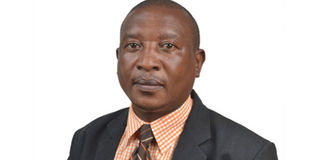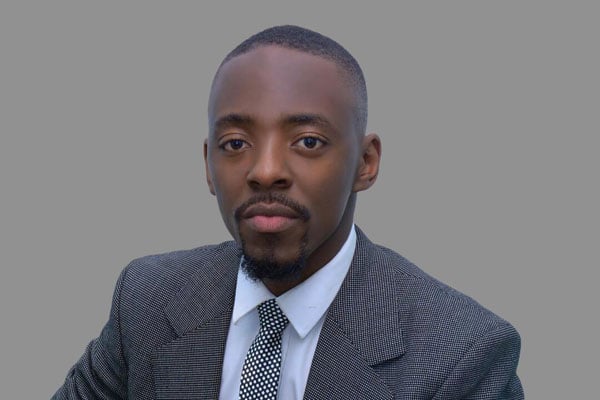Beating Covid: It took me days to know I had Coronavirus

Dr Paul Kasigaire (PhD). PHOTO/COURTESY
What you need to know:
- In our final series on ‘Beating Covid’, we trace victims who caught the virus and overcame it.
- Formerly a principal health tutor at Uganda Institute of Allied Health & Management Sciences-Mulago, Dr Paul Kasigaire (PhD), 47, says he’s lucky to be alive after ‘‘falling seriously ill with Covid-19’. He tells David Vosh Ajuna his story.
“I first felt that something was improper in my body on May 27 as we were returning to Kampala from Masaka City where we had gone for the burial of my friend and staff-mate, health tutor Hussein Ssesanga. Within a short time, I had started feeling tremendous muscle pain that even a drop of water on my body would produce excruciating pain. Thinking that it was usual muscle pain, I opted for massage services at a hotel in Kampala.
Days later, I had to travel to Uganda Civil Service College (UCSC), Jinja City, for official duties. While there, I felt abnormally exhausted by the time I slept at a guest house on May 30. I still thought it was fatigue occasioned by bracing hectic to and fro journeys from Kampala to Gulu, around mid-western Uganda districts, Masaka and then Jinja. Even as that weekend climaxed, it never crossed my mind that I was a potential Covid-19 victim.
On May 31 (Monday), everything changed. The pains in my legs intensified. Still not finely tuned to reality, I thought it was a trapped nerve and instead took Paracetamol. The pain in my chest then increased. I felt like I was being compressed with slabs of concrete. Around the same time, I developed chest congestion, weight loss, stabbing back pain, scathing belly pain, genital pain and joint pains. In another self-medication gamble, I took several antibiotic drugs. Constant pain further subjected me to applying Diclofenac jelly.
Feeling depleted of energy, by June 3, I prematurely left Jinja. I was offered a lift by a colleague, Mr Mark Kalanzi, who dropped me off at Bwaise, Kampala. Heading home in Mulago, I jumped onto a boda boda. When I arrived at my residence, as I was going upstairs, I started experiencing blurred vision. I soldiered on, opened the door and suddenly fell down, luckily landing onto a brief case I had carried along during my Jinja trip. Towards 8:40pm, I was freezing-cold and shivering. At one point, I had four hot water bottles on the sofa-set and two blankets, but I could not get warm.
Seeking help
Then the fever set in. I rested a bit and when I regained some energy, it put me out of denial and I started to believe that I had fallen sick and needed urgent medical attention. Prior to that, I would cough but it wasn’t persistent like the case with most Covid-19 victims. However, my cough would intensify whenever I tried to speak on the phone. On that very day at around 10pm, I sought medical aid at UIAHMS clinic.
UIAHMS’ nurse Maria Arinaitwe rendered me first aid upon establishing that my blood pressure had escalated amid low blood sugar levels and a soaring temperature. My oxygen circulation had significantly dwindled. A combination of the above signs and symptoms prompted my immediate referral to the emergency unit of Mulago National Referral Hospital.
The institute principal’s driver, Mr Yunus Bright, drove me together with the nurse to the hospital. The nurse sufficiently explained my plight to guide medics on duty. Medics at the facility reasonably managed and controlled my blood pressure and diabetes.
“I have to swab you for Covid-19,” one medic said.
He then stuck the swab stick, so far down the back of my throat that I was retching, and then just as I was recovering, he said: “Now I have to do it up your nostrils.” That was followed by a raft of blood tests.
I felt pummeled. All I could think was “What the hell’s going on?” I felt like passing out. I remember a female doctor coming over and telling me: “Your results have come back - you’ve got Covid-19 and you’ll have to be on oxygen, and taken to Namboole treatment centre.’’
As hours went by, I got splitting headaches as I was also deprived of appetite and my sense of taste.
I was vomiting and absolutely wringing wet with sweat and then my breathing got more difficult.
I am diabetic and my harrowing experience really worried me, but I chose to remain optimistic with Willbroad Mugarura by my bedside. Another student and guild-health minister at UIAHMS Enoch Mukisa also gave me company while at Mulago Hospital.
Mr Mugarura had used my phone to inform my Kabale-based wife, Ms Emily Mbabazi, brothers and friends whilst he watched me closely. Seeing the look of helplessness on his face was one of the hardest things as he couldn’t come closer because he was still drenched in fear and the after-impacts of taking a Covid-19 jab.
Taken to Namboole
A day later, I was slipping in and out of consciousness and thus destined for Uganda’s mass Covid-19 admission centre at Namboole National Stadium. The ambulance team arrived on June 3 at around 3pm.
“He’s in a very poor state. We need to bring him into the ambulance and take him quickly,” the nurse in the ambulance remarked before I was taken into the ambulance. Enroute to Namboole with my nephew Justus Ampaire they drove us with another Covid-19 patient and his son.
Upon arrival, we were in a queue of ambulances just waiting to off-load patients from across Uganda. With my fellow victim, frail to the core, we were wheeled into a cubicle of about nine other oxygenated patients at Namboole. While in there with my eyes closed, I listened to everything – people rushing around, phones ringing. General commotion.
I observed scores of patients that lay on the ground in the stadium corridors, not lucky enough to afford a bed.
I observed outnumbered medical workers in a stretched health system that is lacking in some medical supplies clearly offer their all-extending services such as feeding the patients, cleaning the environment and administering treatment.
As days went by, I learnt that all the nine succumbed to the virus within a space of just a week, including a male Kenyan who claimed to have been inoculated at Makerere University Hospital.
Doctors at Namboole revealed to me that the virus had gone directly into my muscles, accounting for my muscle pains. Part of my treatment included counselling and psychological services, Zinc, Vitamin C and Azithro. I was also advised to carry out steam inhalation in the days after I was discharged. By the time pain subsided, I was almost delirious.
Blamed by most
First and foremost, it was really confusing and frightening to know that I had tested for a deadly disease that had at the time killed more than 600,000 people in what’s considered the world’s super power – United States of America.
While I suspect I contracted Covid-19 during field engagements, I always feel guilty that I might have been part of the super spreaders by unknowingly making others sick during interactions before I was diagnosed. Once one relative realised that I had Covid-19, he said: ‘‘I won’t be able to see you until you are alright because that virus is highly contagious and fatal.’’
Under normalcy, I thought this would be the time more people reached out to me to accord me economic, moral, and spiritual support.
I was stigmatised after many people castigated me claiming that I’d been flouting Covid-19 restrictions and SOPs. In fact, some people loosely and blatantly accused me of being an “inconsiderate” bad citizen or neighbour upon noticing that I was sick. Contrary to that, I was very much abiding and compliant with Covid-19 directives and SOPs put in place by authorities. Additionally, being a medical worker teaching several students in health training, I led by example since I was among the people implementing the SOPs.
Even as guilt remained a constant reaction during my battle against Covid-19, I learnt that when something happens that’s out of your complete control, one must look for ways to explain it. It became more logical for me to apportion myself a greater share of the blame. A few days after I was discharged, I was feeling significant fatigue coupled with having a lot of continuing medical concerns but with lots of gratitude for what medical workers and friends had done to save my dear life.
Through my experience, I learnt that guilt can take many forms. It can be persecutory whereby I punish myself over and over for something I perceive to be bad or misguided.
Meanwhile, I also noted that survivor guilt is also a reality. As I was with other Covid-19 patients on the day of discharge, some patients said they were experiencing guilt after emerging from such a traumatic situation.
I observed that they were relatively unscathed and beat themselves up with guilty thoughts upon learning that other victims of the virus had fared worse or even died.
Fear of transmitting the virus to others brewed within me and it became a major problem. Let alone my family and worries about my own health, some of my friends and relatives belong to the vulnerable group and I remained concerned over afflicting them.
Emotional healing
As an expert in Clinical Counselling Psychology, I can testify that existing with a sense of guilt can be pervasive and overwhelming but it can be addressed by therapists and seeking spiritual intervention from God. Covid-19 victims really need to have successful emotional processing.
Discovering whether there’s something you can learn from the experience, giving your mind space to think about something else, and basically connecting physically with others who can offer you any kind of support is help. You might not stop the onslaught of difficult emotions but you can deal with intense feelings. I am grateful to God for giving me another chance and thankful to all those that stood with me.





